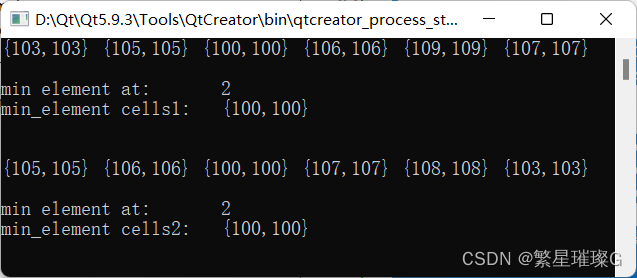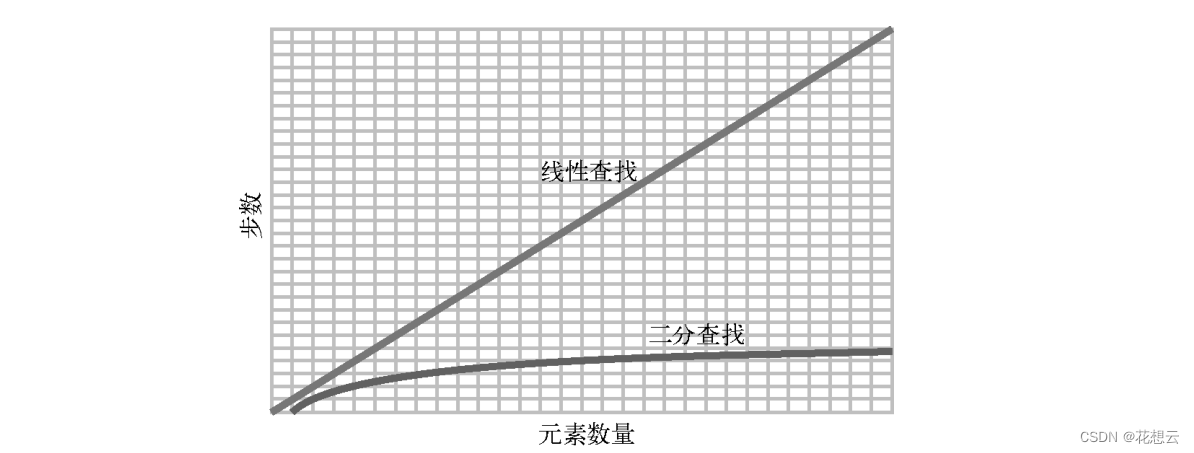定义于头文件 <algorithm>
算法库提供大量用途的函数(例如查找、排序、计数、操作),它们在元素范围上操作。注意范围定义为 [first, last) ,其中 last 指代要查询或修改的最后元素的后一个元素。
返回范围内的最小元素
std::min_element| template< class ForwardIt > | (1) | (C++17 前) |
| template< class ForwardIt > | (C++17 起) | |
| template< class ExecutionPolicy, class ForwardIt > ForwardIt min_element( ExecutionPolicy&& policy, ForwardIt first, ForwardIt last ); | (2) | (C++17 起) |
| template< class ForwardIt, class Compare > | (3) | (C++17 前) |
| template< class ForwardIt, class Compare > | (C++17 起) | |
| template< class ExecutionPolicy, class ForwardIt, class Compare > ForwardIt min_element( ExecutionPolicy&& policy, ForwardIt first, ForwardIt last, Compare comp ); | (4) | (C++17 起) |
寻找范围 [first, last) 中的最小元素。
1) 用 operator< 比较元素。
3) 用给定的二元比较函数 comp 比较元素。
2,4) 同 (1,3) ,但按照 policy 执行。这些重载仅若 std::is_execution_policy_v<std::decay_t<ExecutionPolicy>> 为 true 才参与重载决议。
参数
| first, last | - | 定义要检验范围的向前迭代器 |
| policy | - | 所用的执行策略。细节见执行策略。 |
| comp | - | 比较函数对象(即满足比较 (Compare) 要求的对象),若a 小于 b ,则返回 true 。 比较函数的签名应等价于如下: bool cmp(const Type1 &a, const Type2 &b); 虽然签名不必有 const & ,函数也不能修改传递给它的对象,而且必须接受(可为 const 的)类型 |
| 类型要求 | ||
- ForwardIt 必须满足遗留向前迭代器 (LegacyForwardIterator) 的要求。 | ||
返回值
指向范围 [first, last) 中最小元素的迭代器。若范围中有多个元素等价于最小元素,则返回指向首个这种元素的迭代器。若范围为空则返回 last 。
复杂度
准确比较 max(N-1,0) 次,其中 N = std::distance(first, last) 。
异常
拥有名为 ExecutionPolicy 的模板形参的重载按下列方式报告错误:
- 若作为算法一部分调用的函数的执行抛出异常,且
ExecutionPolicy为标准策略之一,则调用 std::terminate 。对于任何其他ExecutionPolicy,行为是实现定义的。 - 若算法无法分配内存,则抛出 std::bad_alloc 。
可能的实现
版本一
template<class ForwardIt>
ForwardIt min_element(ForwardIt first, ForwardIt last)
{
if (first == last) return last;
ForwardIt smallest = first;
++first;
for (; first != last; ++first) {
if (*first < *smallest) {
smallest = first;
}
}
return smallest;
}版本二
template<class ForwardIt, class Compare>
ForwardIt min_element(ForwardIt first, ForwardIt last, Compare comp)
{
if (first == last) return last;
ForwardIt smallest = first;
++first;
for (; first != last; ++first) {
if (comp(*first, *smallest)) {
smallest = first;
}
}
return smallest;
}调用示例
#include <iostream>
#include <algorithm>
#include <functional>
#include <vector>
#include <iterator>
#include <time.h>
using namespace std;
struct Cell
{
int x;
int y;
Cell &operator +=(const Cell &cell)
{
x += cell.x;
y += cell.y;
return *this;
}
bool operator <(const Cell &cell) const
{
if (x == cell.x)
{
return y < cell.y;
}
else
{
return x < cell.x;
}
}
};
std::ostream &operator<<(std::ostream &os, const Cell &cell)
{
os << "{" << cell.x << "," << cell.y << "}";
return os;
}
int main()
{
srand((unsigned)time(NULL));;
std::cout << std::boolalpha;
auto func1 = []()
{
int n = std::rand() % 10 + 100;
Cell cell{n, n};
return cell;
};
// 初始化cells1
vector<Cell> cells1(6);
std::generate(cells1.begin(), cells1.end(), func1);
// 打印cells1
std::copy(cells1.begin(), cells1.end(), std::ostream_iterator<Cell>(std::cout, " "));
std::cout << std::endl;
std::cout << std::endl;
// 获取队列中最大都元素
std::vector<Cell>::iterator result1;
result1 = std::min_element(cells1.begin(), cells1.end());
std::cout << "min element at: " << std::distance(cells1.begin(), result1) << '\n';
std::cout << "min_element cells1: " << *result1 << std::endl;
std::cout << std::endl;
std::cout << std::endl;
auto larger = [](const Cell & a, const Cell & b)
{
if (a.x == b.x)
{
return a.y < b.y;
}
else
{
return a.x < b.x;
}
};
// 初始化cells2
vector<Cell> cells2(6);
std::generate(cells2.begin(), cells2.end(), func1);
// 打印cells2
std::copy(cells2.begin(), cells2.end(), std::ostream_iterator<Cell>(std::cout, " "));
std::cout << std::endl;
std::cout << std::endl;
// 获取队列中最大都元素
std::vector<Cell>::iterator result2;
result2 = std::min_element(cells2.begin(), cells2.end(), larger);
std::cout << "min element at: " << std::distance(cells2.begin(), result2) << '\n';
std::cout << "min_element cells2: " << *result2 << std::endl;
std::cout << std::endl;
std::cout << std::endl;
return 0;
}
输出

![[附源码]Python计算机毕业设计个人资金账户管理Django(程序+LW)](https://img-blog.csdnimg.cn/4334d7afb2f34075ae531ea2f6730b86.png)


















